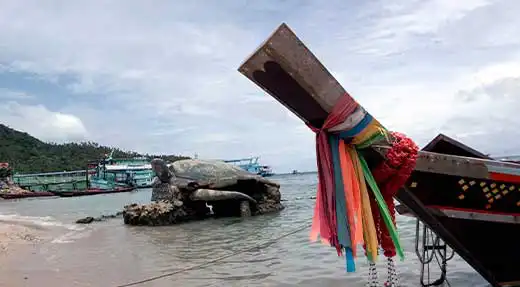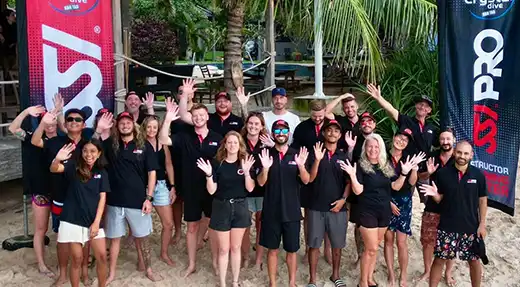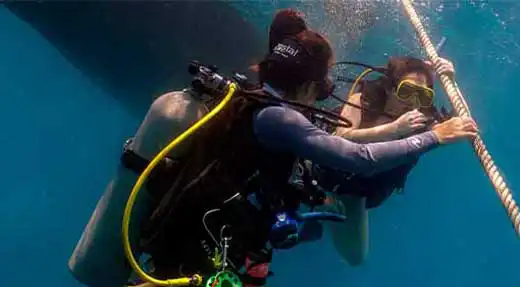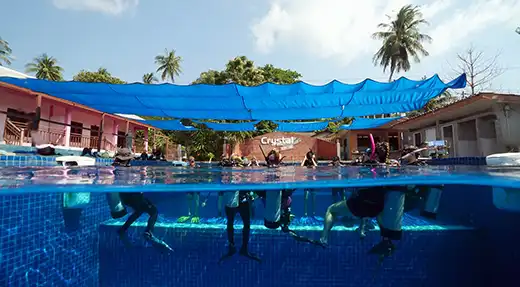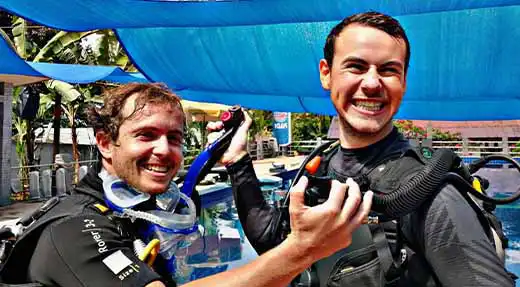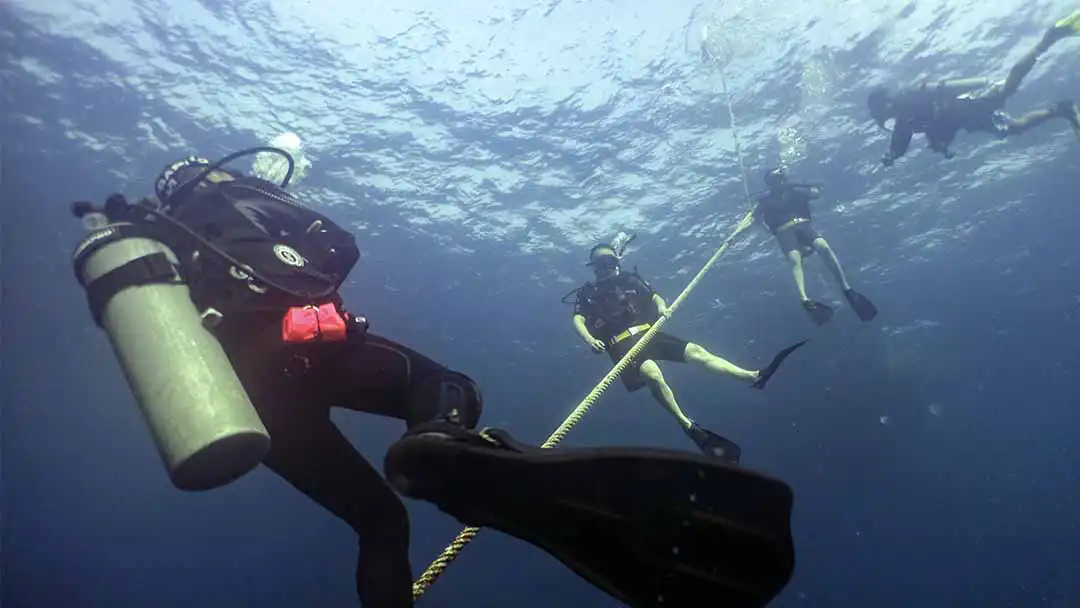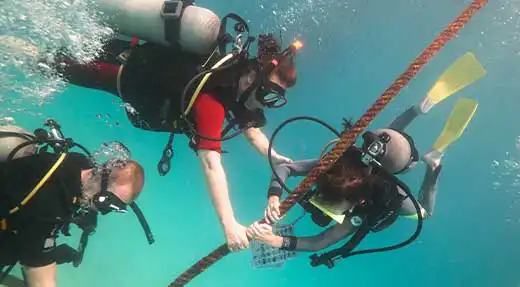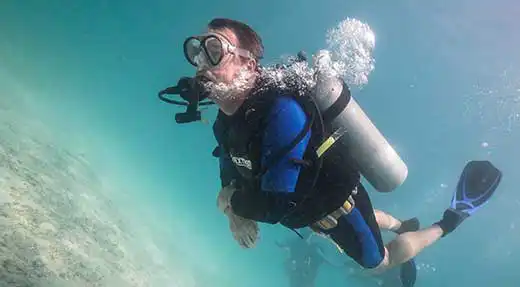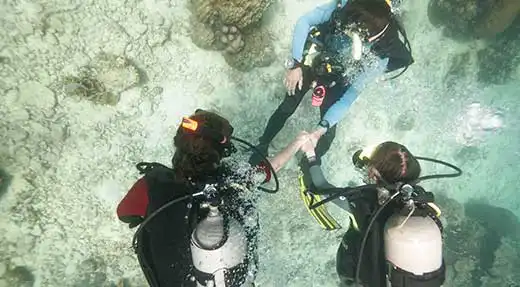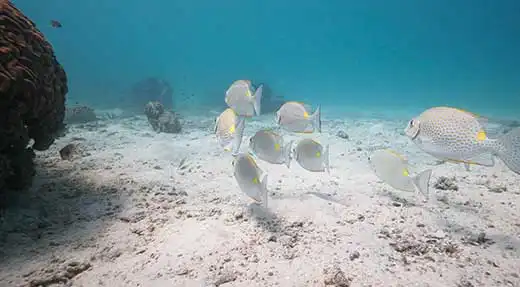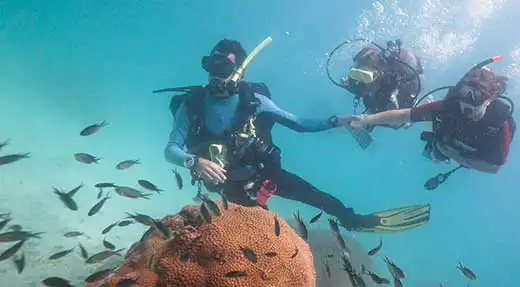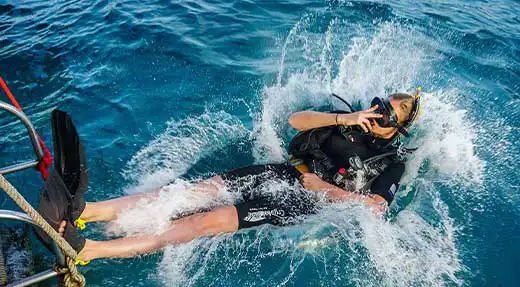Learn to breathe underwater with The Basic Diver Program
SSI’s Basic Diver is the perfect program for people looking to try scuba diving for the first time
The program often referred to as a “Try Dive” or “Discovery Dive”, is designed for individuals with no prior scuba diving experience and who are curious to try it out and find out what it’s like to breathe underwater.
The Basic Diver experience takes as a day to complete. Students start off in one of our purpose built training pools where you get to experience scuba for the first time before venturing onto the coral reefs in open water.
While this program is not classed as an actual scuba diving certification, it will give you a great taste of what scuba and the underwater world are about and open your eyes to new possibilities and to appreciate how much fun this activity can be.
What you will learn
During the 1 day Basic Diver program, you will learn basic safety rules, basic scuba diving skills, hand signals and what it feels like to breathe underwater.
Before you enter the water your Diving instructor will review some questions with you. You will receive online materials once you sign up that describes the information you need to answer the questions.
The basic information will help you understand what it’s like once you step foot into the water. You will cover the scuba equipment used to dive and learn how easy it is to move around underwater with all your gear.
● Find out what it’s like to breathe underwater.
● Learn key skills that you’ll use during every scuba dive.
● Have fun swimming around and exploring.
● Hear about becoming a certified diver through the Open Water Diver course
What skills do you complete?
During your confined water dive you will be required to perform a few simple skills as part of the Basic Diver experience. These skills are based on safety so that you can correct yourself once underwater and to help you build your confidence.
Once in the pool you will be taught how to adjust the scuba diving equipment and take your first breath underwater. Once comfortable your instructor will show you basic hand signals and the basic operations of your BC (Buoyancy Compensator) including how to inflate and deflate the jacket on the surface.
You will then kneel down in the shallow end of the pool and complete a few small exercises, like how to clear a regulator if you take it out, and how to clear water from your mask after smiling. This can be a little tricky at first but is easily overcome when using the correct technique.
The instructor will demonstrate everything first before asking you to repeat the skill. You will practice the different skills until you are comfortable and confident.
How to equalize air spaces
When scuba diving your body will be affected by water pressure, which is similar to the effects you feel when flying in an airplane but as water has more weight than air it exerts greater pressure.
Pressure has no effect on water only air so as your body is mostly made up of water your whole body will not be affected by the pressure change, only a few small areas. These areas are your ears, sinus, lungs and your mask, to be able to complete a dive you must equalize these spaces while diving.
The easiest area to equalize is your lungs, you do this by simply breathing continuously throughout the dive, and this is the most important rule in scuba diving – Breathe continuously and never hold your breath.
The most common area to feel the effects of pressure is in your ears (you will experience this when flying). You should equalize your ears and sinus every meter and the easiest way to do this is to pinch your nose and gently blow against it.
It is highly recommended not to dive when having a cold, congestion or flu as the clogged up airways make it difficult to equalize. The last air space in your mask can be equalized by gently exhaling through your nose every few meters when descending.
Your instructor will show you all the appropriate hand signals and give you solutions to any difficulties you experience.
Do you need to be able to swim to complete the Basic Diver Program?
While it is definitely recommended to be able to swim, mainly to improve your enjoyment, it is not a requirement.
If necessary your instructor will help you move around the dive site while monitoring your equipment and showing you some of the cool marine life on the dive site.
Scuba diving swimming is different to normal swimming, as you do not need to use your arms. You just let the fins on your feet do all the work to propel you through the water.
● Keep your arms folded or by your sides
● Point you toes and keep your body straight
● Slowly kick from the hips with your knees slightly bent
● Aim to move slowly and glide through the water
To become a certified scuba diver on the Open Water Diver Course it is a performance requirement that you have to be able to swim 200 meters with any stroke and also have to be able to tread water or stay afloat for at least 10 minutes.
The reason for this is not for the fact that scuba diving requires you to swim around without equipment, but rather it is for yours and your group’s safety by demonstrating basic watermanship skills.
Basic Diver in the Open Water
After completing the confined session you will be able to head out onto the dive boat to take a dive out in the ocean and get to see the amazing marine life underwater.
You will be closely supervised by your instructor at all times so they can lend assistance if and when necessary. You will dive down to a maximum depth of 12 meters on the dive while you take a tour around the coral reef and dive site.
Basic scuba diving skills and tips
A few basic scuba diving skills and knowledge will help you enjoy your dive more.
Avoid the temptation to touch – simply keep a little distance so you can observe and enjoy the creature you are looking at:
● Breath slow and relaxed – Once you have the regulator in try to breathe slowly, deeply and continuously
● Move and swim slowly – Many animals will swim away and hide from divers if startled, swim calmly and approach creatures slowly.
● Be careful with the environment – keep your hands tucked in to avoid touching anything and be careful with your fins.
How to become Open Water certified
Once completing a dive out in the open water as part of the Basic Diver experience, most people will be interested in continuing their education and to become fully certified.
To complete the course you will need to complete 6 chapters of scuba diving theory with a final exam. Then complete a full confined session, and complete 4 open water-training dives in addition to passing the watermanship tests.
All of this can be completed in as little as 2 and a-half days after completing your Basic Diver Program.
How long does the scuba diving certification last
Scuba diving certifications from SSI never expire, meaning that once you complete a Open Water course you will always be a diver.
However, when taking a Basic Diver Experience, it is not classed as a certification. You may however continue to dive to your hearts content with an instructor for 2 weeks without completing the pool session again.
Once certified many dive centers will require some evidence of recent diving before taking divers out on an open water dive and normally it should be evidence of diving in the last 6 months.
This can be adapted on a case-by-case basis taking certification level and experience into account. If you do not have recent diving experience you will be asked to take a refresher course to refresh the skills you did on your Open Water course to maintain diver safety.
Join the Scuba Club
Scuba Diving is an exciting, adventurous and thrilling activity in which you will see and experience amazing marine life. The Basic Diver Program will be your first introduction to the underwater realm, taking your first breaths underwater and then seeing the amazing coral reefs with the marine life swimming around it will leave you wanting to dive more and take your training to a higher level.
© Crystal Dive Koh Tao
